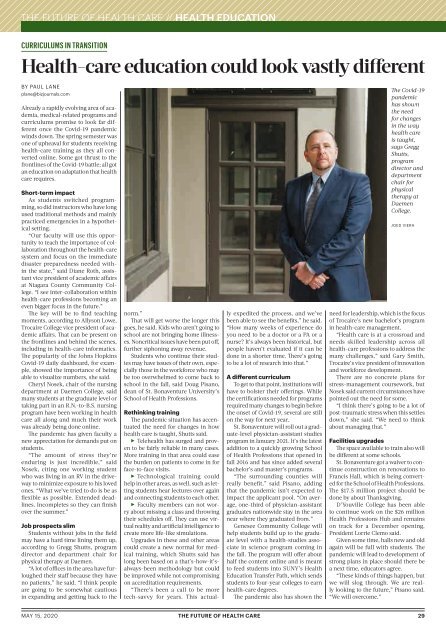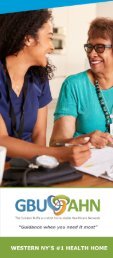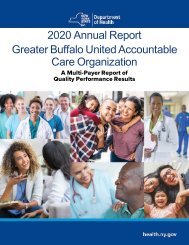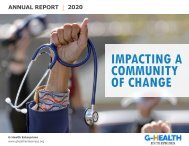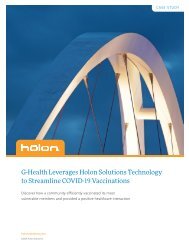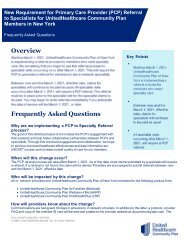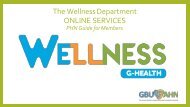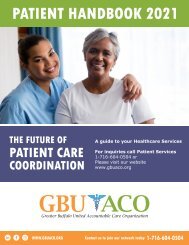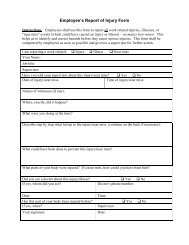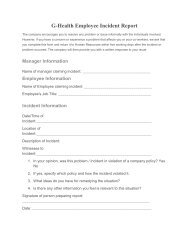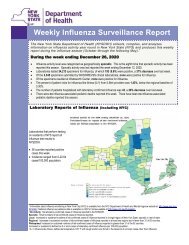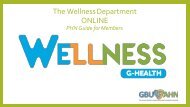Future of Health Care 2020
- No tags were found...
Create successful ePaper yourself
Turn your PDF publications into a flip-book with our unique Google optimized e-Paper software.
THE FUTURE OF HEALTH CARE // HEALTH EDUCATION<br />
CURRICULUMS IN TRANSITION<br />
<strong>Health</strong>-care education could look vastly different<br />
BY PAUL LANE<br />
plane@bizjournals.com<br />
Already a rapidly evolving area <strong>of</strong> academia,<br />
medical-related programs and<br />
curriculums promise to look far different<br />
once the Covid-19 pandemic<br />
winds down. The spring semester was<br />
one <strong>of</strong> upheaval for students receiving<br />
health-care training as they all converted<br />
online. Some got thrust to the<br />
frontlines <strong>of</strong> the Covid-19 battle; all got<br />
an education on adaptation that health<br />
care requires.<br />
Short-term impact<br />
As students switched programming,<br />
so did instructors who have long<br />
used traditional methods and mainly<br />
practiced emergencies in a hypothetical<br />
setting.<br />
“Our faculty will use this opportunity<br />
to teach the importance <strong>of</strong> collaboration<br />
throughout the health-care<br />
system and focus on the immediate<br />
disaster preparedness needed within<br />
the state,” said Diane Roth, assistant<br />
vice president <strong>of</strong> academic affairs<br />
at Niagara County Community College.<br />
“I see inter-collaboration within<br />
health-care pr<strong>of</strong>essions becoming an<br />
even bigger focus in the future.”<br />
The key will be to find teaching<br />
moments, according to Allyson Lowe,<br />
Trocaire College vice president <strong>of</strong> academic<br />
affairs. That can be present on<br />
the frontlines and behind the scenes,<br />
including in health-care informatics.<br />
The popularity <strong>of</strong> the Johns Hopkins<br />
Covid-19 daily dashboard, for example,<br />
showed the importance <strong>of</strong> being<br />
able to visualize numbers, she said.<br />
Cheryl Nosek, chair <strong>of</strong> the nursing<br />
department at Daemen College, said<br />
many students at the graduate level or<br />
taking part in an R.N.-to-B.S. nursing<br />
program have been working in health<br />
care all along and much their work<br />
was already being done online.<br />
The pandemic has given faculty a<br />
new appreciation for demands put on<br />
students.<br />
“The amount <strong>of</strong> stress they’re<br />
enduring is just incredible,” said<br />
Nosek, citing one working student<br />
who was living in an RV in the driveway<br />
to minimize exposure to his loved<br />
ones. “What we’ve tried to do is be as<br />
flexible as possible. Extended deadlines.<br />
Incompletes so they can finish<br />
over the summer.”<br />
Job prospects slim<br />
Students without jobs in the field<br />
may have a hard time lining them up,<br />
according to Gregg Shutts, program<br />
director and department chair for<br />
physical therapy at Daemen.<br />
“A lot <strong>of</strong> <strong>of</strong>fices in the area have furloughed<br />
their staff because they have<br />
no patients,” he said. “I think people<br />
are going to be somewhat cautious<br />
in expanding and getting back to the<br />
norm.”<br />
That will get worse the longer this<br />
goes, he said. Kids who aren’t going to<br />
school are not bringing home illnesses.<br />
Noncritical issues have been put <strong>of</strong>f,<br />
further siphoning away revenue.<br />
Students who continue their studies<br />
may have issues <strong>of</strong> their own, especially<br />
those in the workforce who may<br />
be too overwhelmed to come back to<br />
school in the fall, said Doug Pisano,<br />
dean <strong>of</strong> St. Bonaventure University’s<br />
School <strong>of</strong> <strong>Health</strong> Pr<strong>of</strong>essions.<br />
Rethinking training<br />
The pandemic situation has accentuated<br />
the need for changes in how<br />
health care is taught, Shutts said.<br />
R R Telehealth has surged and proven<br />
to be fairly reliable in many cases.<br />
More training in that area could ease<br />
the burden on patients to come in for<br />
face-to-face visits.<br />
R R Technological training could<br />
help in other areas, as well, such as letting<br />
students hear lectures over again<br />
and connecting students to each other.<br />
R R Faculty members can not worry<br />
about missing a class and throwing<br />
their schedules <strong>of</strong>f. They can use virtual<br />
reality and artificial intelligence to<br />
create more life-like simulations.<br />
Upgrades in these and other areas<br />
could create a new normal for medical<br />
training, which Shutts said has<br />
long been based on a that’s-how-it’salways-been<br />
methodology but could<br />
be improved while not compromising<br />
on accreditation requirements.<br />
“There’s been a call to be more<br />
tech-savvy for years. This actually<br />
expedited the process, and we’ve<br />
been able to see the benefits,” he said.<br />
“How many weeks <strong>of</strong> experience do<br />
you need to be a doctor or a PA or a<br />
nurse? It’s always been historical, but<br />
people haven’t evaluated if it can be<br />
done in a shorter time. There’s going<br />
to be a lot <strong>of</strong> research into that.”<br />
A different curriculum<br />
To get to that point, institutions will<br />
have to bolster their <strong>of</strong>ferings. While<br />
the certifications needed for programs<br />
required many changes to begin before<br />
the onset <strong>of</strong> Covid-19, several are still<br />
on the way for next year.<br />
St. Bonaventure will roll out a graduate-level<br />
physician-assistant studies<br />
program in January 2021. It’s the latest<br />
addition to a quickly growing School<br />
<strong>of</strong> <strong>Health</strong> Pr<strong>of</strong>essions that opened in<br />
fall 2016 and has since added several<br />
bachelor’s and master’s programs.<br />
“The surrounding counties will<br />
really benefit,” said Pisano, adding<br />
that the pandemic isn’t expected to<br />
impact the applicant pool. “On average,<br />
one-third <strong>of</strong> physician-assistant<br />
graduates nationwide stay in the area<br />
near where they graduated from.”<br />
Genesee Community College will<br />
help students build up to the graduate<br />
level with a health-studies associate<br />
in science program coming in<br />
the fall. The program will <strong>of</strong>fer about<br />
half the content online and is meant<br />
to feed students into SUNY’s <strong>Health</strong><br />
Education Transfer Path, which sends<br />
students to four-year colleges to earn<br />
health-care degrees.<br />
The pandemic also has shown the<br />
The Covid-19<br />
pandemic<br />
has shown<br />
the need<br />
for changes<br />
in the way<br />
health care<br />
is taught,<br />
says Gregg<br />
Shutts,<br />
program<br />
director and<br />
department<br />
chair for<br />
physical<br />
therapy at<br />
Daemen<br />
College.<br />
JOED VIERA<br />
need for leadership, which is the focus<br />
<strong>of</strong> Trocaire’s new bachelor’s program<br />
in health-care management.<br />
“<strong>Health</strong> care is at a crossroad and<br />
needs skilled leadership across all<br />
health-care pr<strong>of</strong>essions to address the<br />
many challenges,” said Gary Smith,<br />
Trocaire’s vice president <strong>of</strong> innovation<br />
and workforce development.<br />
There are no concrete plans for<br />
stress-management coursework, but<br />
Nosek said current circumstances have<br />
pointed out the need for some.<br />
“I think there’s going to be a lot <strong>of</strong><br />
post-traumatic stress when this settles<br />
down,” she said. “We need to think<br />
about managing that.”<br />
Facilities upgrades<br />
The space available to train also will<br />
be different at some schools.<br />
St. Bonaventure got a waiver to continue<br />
construction on renovations to<br />
Francis Hall, which is being converted<br />
for the School <strong>of</strong> <strong>Health</strong> Pr<strong>of</strong>essions.<br />
The $17.5 million project should be<br />
done by about Thanksgiving.<br />
D’Youville College has been able<br />
to continue work on the $26 million<br />
<strong>Health</strong> Pr<strong>of</strong>essions Hub and remains<br />
on track for a December opening,<br />
President Lorrie Clemo said.<br />
Given some time, halls new and old<br />
again will be full with students. The<br />
pandemic will lead to development <strong>of</strong><br />
strong plans in place should there be<br />
a next time, educators agree.<br />
“These kinds <strong>of</strong> things happen, but<br />
we will slog through. We are really<br />
looking to the future,” Pisano said.<br />
“We will overcome.”<br />
O<br />
MAY 15, <strong>2020</strong> THE FUTURE OF HEALTH CARE 29


